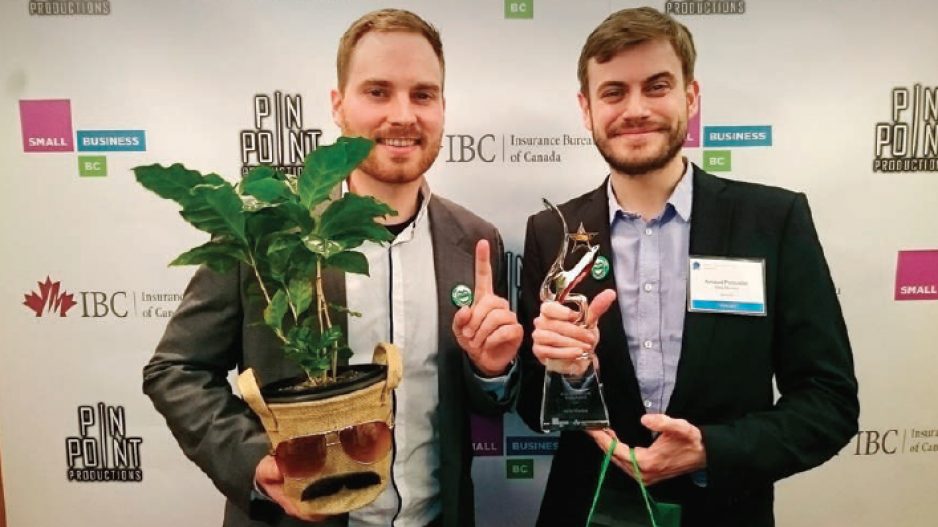A Vancouver-based company has become a leading pioneer in making tea from coffee leaves, a part of the coffee plant that coffee farms typically throw away.
Since November 2016, Wize Monkey’s product distribution has grown rapidly – from 25 stores in Vancouver to more than 200 stores worldwide.
A beverage brewed from coffee leaves, containing about the same amount of caffeine as green tea, has been consumed in Ethopia and Indonesia for hundreds of years, and is purported to have antioxidant properties and other health benefits.
“The product is so versatile,” said Wize Monkey co-founder and CEO Max Rivest. “You can cook with it, make cosmetics and make kombucha. Customers are getting creative, and it’s driving the industry to call us up and see if they can get some.”
After raising close to $12,000 in a Kickstarter campaign in November 2014, Rivest and co-founder Arnaud Petitvallet started taking pre-orders and sending samples from their first batch in spring 2015. After that, they started to gather distributors and eventually got into 25 stores around Vancouver.
Along with the crowdfunding campaign, they were financed by credit cards, friends and family to get the initial batches created. They also took several micro-loans from BDC, Futurepreneur Canada and Vancity credit union to get their business going.
Their products are sourced from a 2,000-acre farm in Nicaragua owned by third-generation farmer Enrique Ferrufino. The operation employs approximately 1,000 people and raises more than two million coffee plants.
“As things progress, we might start sourcing from other places, like Mexico, Guatemala and Brazil,” Rivest said. “For now, we have such a high capacity on our current farm that there’s no reason to go anywhere else, [or] else it becomes a lot of work and a big distraction.”
Louise Roberge, president of the Tea and Herbal Association of Canada, said there have been significant changes in the Canadian tea market over the last few years as more unusual teas gain broader acceptance.
“Tea products are more diversified,” Roberge said. “Herbal teas are getting more popular – not only peppermint or chamomile, but pomegranate, caramel and peaches.”
Wize Monkey’s unflavoured product, which is legally classified as a herbal tea, is said to taste like black tea, but smoother with a slightly sweet finish. The company also offers its coffee-leaf tea in Earl Grey, jasmine, mango and mint varieties.
Besides the products, the company has made a selling point of its sustainability initiative. Wize Monkey provides year-round employment for coffee workers through jobs collecting coffee leaves in the off-season, when the three-month bean harvest ends. This is important for labourers because it means they don’t have to migrate to the city to find another job, and it allows their children to stay in school.
One expert in the tea sector said that coffee-leaf tea can target both tea and coffee drinkers.
“I love their business model,” said Angela Pryce, a global tea consultant in London. “The sustainability story is strong, as it potentially solves a problem faced by many agricultural sectors – that [of] being seasonal employment. Many regions face this problem, not just growing coffee, but other crops too, like tea and cacao.”
One of Wize Monkey’s main challenges is the temptation to expand too quickly.
“There’s so much to work on, and the ceiling for the industry is so high,” Rivest said. “It’ll become way bigger than us eventually, but we’re working on the first edition [of coffee-leaf tea] as hard as we can. That’ll set the standard and drive innovation in the category.”
In the next six months, the company plans to enter the U.S. market.
“In the tea market in U.S., there’s not much innovation happening,” said Petitvallet, Wize Monkey’s chief operating officer. “So, now is the right time to bring our new products to the U.S. and get distribution on the West Coast going.”
In the long run, they’re planning to add bottled iced tea to the lineup, but it’s going to be a huge undertaking requiring a separate business model. •




